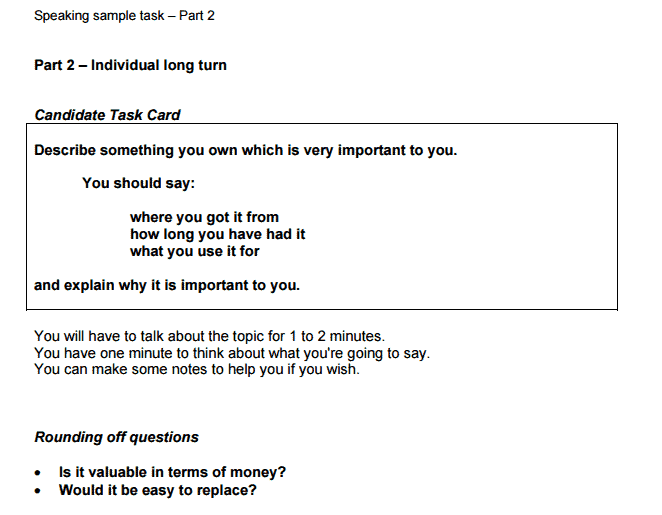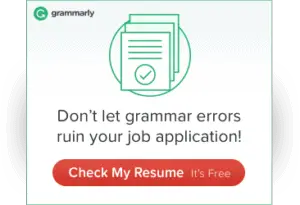How To Succeed In IELTS Speaking Part 2 (Individual Long Turn). In this section the candidate is presented with a topic card with a series of four short bullet points on it, like this one pictured:

Where To Start…
 The candidate has one minute to prepare and is also given a pencil and paper to write notes on.
The candidate has one minute to prepare and is also given a pencil and paper to write notes on.
They will then be expected to talk about the bullet points for between 1-2 minutes, or until stopped by the examiner.
Candidates should use the preparation time to look at the prompts to give them ideas and organise their thoughts.
Extended answers are encouraged in the same way as Part 1 as and longer answers will generally score higher for Fluency.
How To Get A High Band Score
Let’s look at how you can score highly for the four skills you will be tested on:
1. Fluency and Coherence
2. Pronunciation
3. Grammar
4. Lexical Resource (vocabulary)
Fluency
To sound more fluent and to give yourself more time to think when you need it, you can use fillers.
If you don’t use fillers at times when you are thinking your speech can sound very unnatural and awkward. All native speakers use fillers, it is very normal!
Natural Fillers:
you see …, let me think …, in actual fact …, now … .right…, let me see…, well…,
Here is an example response to the question card above. Read it aloud and see how the filler words give the speaker time to think.
“Right, I’m going to tell you about something very special to me, a small teddy bear called Ted. You see… I got Ted from a stranger who passed him to me when I was very young and I errrr… always thought that it was a very nice thing for a stranger to do.
How long have I had it… hmmm let me see… about 16 years, yes, since I was in primary school. I use him for, well… just to cheer me up sometimes when I’m feeling a bit upset.”
In this way the speaker can continue his speech without the need to pause and disrupt the flow, this improves the fluency of the presentation.
Coherence (Do I Make Sense?)
The coherence of a speaker can be improved by using linking phrases to help organize their thoughts into different sections. These are sometimes called signposting words:
Functions - Linking Phrase(s)
Giving an opinion: I didn’t think…
Changing the subject: Anyway…
Giving a reason: Because…Due to...
Saying what happened next: Afterwards…Following that...
Referring back to something: As I said… You may recall...
Giving an example: Like…
Simple linking words also make it easier to listen to and follow a talk. Words such as next, then and after that do this job well too.
A Band 7 level candidate will be able to ‘speak at length without noticeable effort or loss of coherence’ and use a range of linking words.
Lower band levels students will probably start to repeat the same linking phrases and hesitate with their use occasionally.
Another useful skill relevant to this part of the test is that of paraphrasing. If you forget what a word you want to use is then this is what you need to do.
Here is an example of someone paraphrasing:
"I have had the picture for a long time already. It is an…. Well, It has been in the family for hundreds of years already through many generations."
Here the speaker cannot remember the word ‘ancient’ so rather than stopping to think and leave a silence they continue speaking by just describing the word they want to say instead.
For a Band 7 the candidate has to be able to paraphrase effectively. At Band 6 the candidate should usually be able to paraphrase successfully while at Band 5 when the speaker tries paraphrase they do so with mixed success.
Providing synonyms for a word or giving a definition are the two main ways in which you can paraphrase.
Grammar
Learners hoping to score a band 6 or above will need to demonstrate a range of grammatical structures. An effective way to do this in Task 2 is to start your sentences in different ways. Do not just use ‘I’, ‘we’, ‘she’ etc…
Possible Sentence Starters:
♦ What makes me (angry/happy) is …
♦ The person I most (admire/respect) is …
♦ The thing (I like) is …
♦ One thing (I do) is …
♦ The reason why I (did this) was …
♦ One of the reasons (I’ve decided to talk about …) is …
♦ Having (finished that) I …
♦ After that,as soon as, while, or as a result
Candidates often get stressed about their grammar, but having a few different sentence starters like these ready to use is ideal.
Grammar is not all about knowing what verbs and adjectives are. Examiners want to see that you can use the language not just label it!
How To Get It Right First Time
Finally for this section, here are a few more guidelines to help:
Final Reminders:
♦ Do speak clearly.
♦ Do make some notes beforehand.
♦ Don’t pause inappropriately.
♦ Don’t keep referring to your notes.
♦ Do pause at the end of sentences.
♦ Don’t speak quickly.
♦ Do stress the important words.
♦ Do look at the examiner you are speaking to.
Now you’ve read ‘How To Do IELTS Speaking Part 2’ you might want to try:


